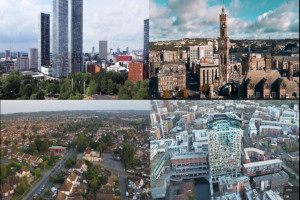**Introduction** In the journey of faith, supplications (Dua) hold a special place in the hearts of Muslims. These heartfelt invocations connect believers to Allah, offering peace, guidance, and healing during times of need. In this post, we explore 5 transformative Islamic supplications that every believer should know, along with their Arabic versions and transliterations. — **1. Supplication for Protection** *Background:* The Prophet Muhammad (peace be upon him) taught this Dua for protection from harm. *Meaning:* “In Your name, I seek refuge from all evil.” *Arabic Version:* بِسْمِكَ اللّهُمَّ أَعُوذُ بِكَ…
Read MoreCategory: Spirituality
Breaking the Misconceptions About Spirituality: What It Really Means
In a world filled with diverse beliefs, traditions, and practices, spirituality has often been misunderstood and misrepresented. While it’s a concept that dates back thousands of years and touches nearly every aspect of human life, misconceptions about spirituality abound. Many people equate it with organized religion, think it’s all about meditation or chanting, or see it as something “mystical” or “supernatural.” However, spirituality is a deeply personal journey, far more complex and nuanced than the common misconceptions surrounding it. In this article, we’ll explore some of the most prevalent…
Read MoreThe essence of worship is to prioritize the Creator and the spiritual
Religious practice, whether one identifies as Muslim, Christian, Hindu, or adherent of any other faith, should never become a mere mechanical or lifeless ritual. The essence of spirituality lies in the connection between the individual and the Creator, transcending the physical acts of worship to delve into the heart of belief. In Islam, the Quran emphasizes the importance of intention (niyyah) behind every action. It teaches that the value of any deed is determined not just by the act itself but by the sincerity of the heart performing it.…
Read MoreTop Cities with the Highest Percentage of Muslims in France: A Demographic Overview
Since France does not officially collect data on religious affiliation due to its principle of laïcité (separation of church and state), there are no official statistics on the number of Muslims in specific cities. The available information is based on estimates and studies. However, there are some cities and regions in France known to have higher numbers of Muslims due to historical and social factors. Here are some cities with significant Muslim populations, based on estimates: 1. **Marseille**: Marseille is estimated to have a Muslim population of about 20-30%. It…
Read MoreTop UK Cities with the Highest Percentage of Muslims: A Demographic Overview
The United Kingdom, known for its rich cultural diversity, is home to a significant Muslim population that has grown steadily over the decades. This increase is more pronounced in certain cities, largely due to historical migration patterns, economic opportunities, and community networks. Below, we explore the UK cities with the highest percentage of Muslims, classify them based on these demographics, and discuss the trends expected in the coming decades. 1. Birmingham Muslim Population Percentage: Approximately 27% Birmingham, the UK’s second-largest city, boasts one of the highest percentages of Muslims…
Read MoreJustice in Islam: A Divine Foundation
The concept of justice (*‘adl* in Arabic) is central to Islam and is repeatedly emphasized in the Quran. Justice is not merely a moral virtue but a divine imperative that every Muslim is required to uphold. The Quran, in several verses, enjoins believers to be just, even if it goes against their own interests or those of their community. For example, in verse 4:135, the Quran states: > “O you who believe! Be persistently standing firm in justice, witnesses for Allah, even if it be against yourselves or your parents…
Read MoreWhy some Prayers May Not Be Accepted: An Islamic Perspective with Quranic and Prophetic Guidance**
Prayer (du’a) is a profound act of worship in Islam, serving as a direct communication between the believer and Allah. However, many Muslims find themselves wondering why their prayers go unanswered. Understanding the reasons behind this can be deeply enlightening. The Quran and the Sunnah (the teachings and practices of the Prophet Muhammad, peace be upon him) provide clear guidance on why certain prayers may not be accepted. Here are three main reasons, grounded in these sources. **Involvement in Prohibited (Haram) Acts** One of the primary…
Read MoreMany Messengers, One Message: The Unified Call of All Prophets
Islamic theology emphasizes a profound and unifying concept: all prophets sent by Allah delivered a consistent and singular message. This message was to worship Allah alone and to live righteously according to His guidance. The Quran and the Sunnah (the teachings and practices of the Prophet Muhammad, peace be upon him) provide numerous evidences supporting this assertion. Quranic Evidence of a Unified Message The Quran, the final revelation in Islam, underscores that all prophets shared a common mission. Surat Al-Anbiya (21:25) clearly states: “And We sent not before you any…
Read MoreThe Importance of Justice and the Consequences of Oppression in Islam
Islam is a religion that emphasizes the importance of justice and the severe consequences of oppression. While belief in Tauhid (the Oneness of Allah) is the cornerstone of the Islamic faith, it must be accompanied by righteous actions and just behavior towards others. The Quran and the Sunnah of the Prophet Muhammad (peace be upon him) provide clear guidance on the significance of avoiding oppression and upholding justice. 1. The Importance of Justice Allah commands justice in the Quran: > “Indeed, Allah commands you to render trusts to whom they…
Read MoreHow Minor Sins Can Escalate into Major Sins: 5 Ways with Clear Examples
In many religious traditions, sins are categorized into minor and major, with the latter being more severe in terms of their impact and consequences. However, even minor sins can escalate into major ones if not addressed properly. Here are five ways this escalation can happen, illustrated with clear examples. **Repeated Occurrence and Habit Formation** Minor sins can become major if they are repeated frequently enough to form a habit. When a person becomes accustomed to committing a sin, they may start to view it as insignificant, leading to a more…
Read More








